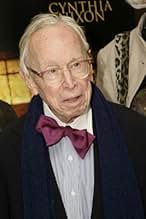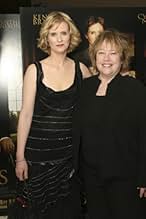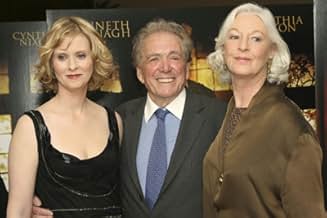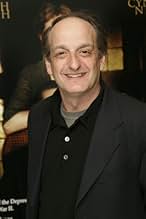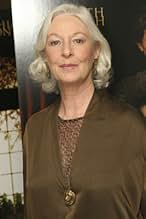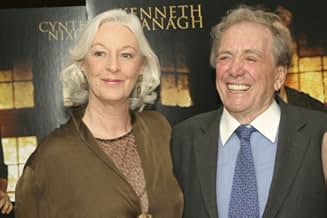NOTE IMDb
7,4/10
3,5 k
MA NOTE
Ajouter une intrigue dans votre langueThe stirring true story of Franklin D. Roosevelt's battle with polio in 1921.The stirring true story of Franklin D. Roosevelt's battle with polio in 1921.The stirring true story of Franklin D. Roosevelt's battle with polio in 1921.
- Réalisation
- Scénario
- Casting principal
- Récompensé par 5 Primetime Emmys
- 12 victoires et 42 nominations au total
Matt O'Leary
- Fred Botts
- (as Matthew O'Leary)
Andy Davoli
- Jake Perini
- (as Andrew Davoli)
Brian F. Durkin
- Elliott Roosevelt
- (as Brian Durkin)
Avis à la une
This is a very good film on the evolution of FDR from having a rather detached philosophy of noblesse oblige to having the cause of the downtrodden brought up close and personal when he becomes crippled from polio at the age of 39.
The acting and production values are superb, but the film tries to paint over a few things in order to make FDR's evolution look more perfect than it was. The truth is FDR and his wife Eleanor never truly reconciled after his illness as is shown in the film. It did not bring them close together. The only reason they did not divorce was the insistence of Roosevelt's mother, and then as FDR got more involved in politics, appearance was involved in them staying together. FDR and Lucy Mercer, the woman he wanted to divorce Eleanor for, carried on a relationship of sorts from 1915 until Roosevelt died in 1945. Lucy Mercer was with him when he died at Warm Springs. I say this not as a character assassination of a truly great leader long dead, but to point out that a person can be far less than perfect personally and still be that truly great leader. This film's makers seem to think the viewer is not smart enough to deal with that.
There is one bit more of oversimplification that made me roll my eyes. After FDR gets involved in the running of Warm Springs, some patients from the Northeast arrive. One of them, with an obvious New York accent, shakes the hands of one of the black caretakers. The black caretaker looks shocked to be treated as an equal by a white man. The insinuation here is that racial prejudice did not exist in the Northeastern U.S. which is poppycock. Some of the most racially prejudiced people you'll meet are from the Northern U.S. See some episodes of "All in the Family" to see the awful truth.
Now in only two paragraphs I can tell you everything I don't like about this film and I just did that. If not for these two white-washings I'd give it ten stars and I still highly recommend you watch it if you get the chance. Cynthia Nixon really makes you believe she is Eleanor Roosevelt, and Kenneth Branagh is superb as FDR, a man who has to come to terms with his new limitations and yet sees how lucky he was to have at least 39 years of good health and the financial resources to deal with his own health and maybe help some other people too. There's always someone worse off than you are, and maybe you can lend them a helping hand is the inspirational message of this film to me. Highly recommended.
The acting and production values are superb, but the film tries to paint over a few things in order to make FDR's evolution look more perfect than it was. The truth is FDR and his wife Eleanor never truly reconciled after his illness as is shown in the film. It did not bring them close together. The only reason they did not divorce was the insistence of Roosevelt's mother, and then as FDR got more involved in politics, appearance was involved in them staying together. FDR and Lucy Mercer, the woman he wanted to divorce Eleanor for, carried on a relationship of sorts from 1915 until Roosevelt died in 1945. Lucy Mercer was with him when he died at Warm Springs. I say this not as a character assassination of a truly great leader long dead, but to point out that a person can be far less than perfect personally and still be that truly great leader. This film's makers seem to think the viewer is not smart enough to deal with that.
There is one bit more of oversimplification that made me roll my eyes. After FDR gets involved in the running of Warm Springs, some patients from the Northeast arrive. One of them, with an obvious New York accent, shakes the hands of one of the black caretakers. The black caretaker looks shocked to be treated as an equal by a white man. The insinuation here is that racial prejudice did not exist in the Northeastern U.S. which is poppycock. Some of the most racially prejudiced people you'll meet are from the Northern U.S. See some episodes of "All in the Family" to see the awful truth.
Now in only two paragraphs I can tell you everything I don't like about this film and I just did that. If not for these two white-washings I'd give it ten stars and I still highly recommend you watch it if you get the chance. Cynthia Nixon really makes you believe she is Eleanor Roosevelt, and Kenneth Branagh is superb as FDR, a man who has to come to terms with his new limitations and yet sees how lucky he was to have at least 39 years of good health and the financial resources to deal with his own health and maybe help some other people too. There's always someone worse off than you are, and maybe you can lend them a helping hand is the inspirational message of this film to me. Highly recommended.
8=G=
"Warm Springs" is a tour de force by Branagh who portrays FDR as a man of money and privilege who is struck down by polio in the early days of his political career. Unable to use his legs he begins to wallow in self pity until he visits a Georgia mineral water spa called Warm Springs where he finds honesty, compassion, kinship, and most of all himself, his wife, and a new sense of purpose. A very pretty period film with good production value, an excellent supporting cast, and sterling performances by Branagh and Nixon, "Warm Springs" would have made an enjoyable stand alone drama. The fact that it's also a biopic about FDR only serves to make it that much more interesting. Another winner for the whole family from HBO. (B+)
I'm in shock that two people gave this excellent film a 1 out of 10. I can perhaps see how some didn't enjoy it quite as much as I did, but to rate it as awful shows just plain ignorance to me.
Not only is this gem beautifully scripted, wonderfully shot and edited, as well as tremendously directed, but Cynthia Nixon and Kenneth Branagh dominate. I am familiar with a wide selection of Branagh's work, and this is one of his best performances to date! FDR is my favorite President, and I surely feel that Branagh does justice to the man.
On a personal note, I was brought to tears on three separate occasions when watching this film. Now, this may not seem like much, but rare is it that a tear falls from my eye even once during a showing.
Please, please see this film, if only for it's inspiration. I believe this is a sadly overlooked masterpiece, and we must not allow it to be forgotten. If you liked his Hamlet, you'll love his Franklin.
Not only is this gem beautifully scripted, wonderfully shot and edited, as well as tremendously directed, but Cynthia Nixon and Kenneth Branagh dominate. I am familiar with a wide selection of Branagh's work, and this is one of his best performances to date! FDR is my favorite President, and I surely feel that Branagh does justice to the man.
On a personal note, I was brought to tears on three separate occasions when watching this film. Now, this may not seem like much, but rare is it that a tear falls from my eye even once during a showing.
Please, please see this film, if only for it's inspiration. I believe this is a sadly overlooked masterpiece, and we must not allow it to be forgotten. If you liked his Hamlet, you'll love his Franklin.
10arturus
In spite of some liberties being taken with events and personages for dramatic effect, this is a remarkably well-done retelling of the first four years after Franklin Roosevelt was stricken with infantile paralysis.
This version is less sentimental and perhaps more truthful than "Sunrise at Campobello", Dory Shary's play and film, from 1958 and 1960, covering the same events. Perhaps that is because many of the people involved were still living at the time, and the events and personages were still in living memory for so many in the audience for that piece, in 1960.
This version, however, minces no words and does not turn away from the grim reality of all the challenges Franklin faced, emotional and physical, in dealing with his illness. The performances of all involved are excellent. It is a challenge to portray people so well known to so many, and these actors, all of them, shine in their roles.
Central to all of this of course must be the performance of the actor playing FDR. For many, after "Sunrise at Campobello", only Ralph Bellamy could play Roosevelt, and he did it with great panache, even to repeating his performance twice, twenty and thirty years later, in the miniseries "Winds of War" and "War and Remembrance" in the 80s.
Without a doubt Kenneth Branagh gives what must be one of the best performances on film I have ever seen. He never descends to caricature or impersonation, he does not really look like FDR, he only gives suggestions of Franklin's speech rhythms and accent. But this actor inhabits the character as written so completely, with such wide emotional, physical and vocal range that I for one was totally convinced. This is truly a great film performance, worthy of any awards that it gets. And I hope it is recognized.
This version is less sentimental and perhaps more truthful than "Sunrise at Campobello", Dory Shary's play and film, from 1958 and 1960, covering the same events. Perhaps that is because many of the people involved were still living at the time, and the events and personages were still in living memory for so many in the audience for that piece, in 1960.
This version, however, minces no words and does not turn away from the grim reality of all the challenges Franklin faced, emotional and physical, in dealing with his illness. The performances of all involved are excellent. It is a challenge to portray people so well known to so many, and these actors, all of them, shine in their roles.
Central to all of this of course must be the performance of the actor playing FDR. For many, after "Sunrise at Campobello", only Ralph Bellamy could play Roosevelt, and he did it with great panache, even to repeating his performance twice, twenty and thirty years later, in the miniseries "Winds of War" and "War and Remembrance" in the 80s.
Without a doubt Kenneth Branagh gives what must be one of the best performances on film I have ever seen. He never descends to caricature or impersonation, he does not really look like FDR, he only gives suggestions of Franklin's speech rhythms and accent. But this actor inhabits the character as written so completely, with such wide emotional, physical and vocal range that I for one was totally convinced. This is truly a great film performance, worthy of any awards that it gets. And I hope it is recognized.
Having been a a patient at Warm Springs for many years during the 1930s and late 1940s, I feel qualified to critique the HBO movie, Warm Springs. The feel of the period and the scenes of the Warm Springs area were fairly realistic. The Meriwether Inn and the surrounding grounds were located on top of a hill, and not on flat ground. The pool where everyone swam was the authentic pool that FDR asked his friend Edsel Ford to build for him, after he acquired the property. I have swum in the pool many times. FDR was a man of great humor, and this is what is lacking in Kenneth Branagh's portrayal. Branagh completely missed the essence of the man, but so would any actor who attempted to portray FDR. Fred Botts was a great friend of mine, and when he arrived in Warm Springs, it was in the baggage car of the train. His brother accompanied him, and had modified a packing crate for him to rest in. He couldn't sit up for very long without experiencing great discomfort. He could stand up, or he could lie down, so he asked his brother to build him the crate so he could ride in comfort from Pittsburgh to Warm Springs. FDR's first words to him upon Fred's arrival were, "You must be the skeleton from Pennsylvania." Fred was tall and very thin. In 1916, Fred was working toward his debut with the Metropolitan Opera in New York City. Among his admirers and supporters was Enrico Caruso. When polio struck him, his singing career ended, and he returned home to Pennsylvania, where he remained a prisoner in his family home for 10 years. When he arrived at Warm Springs, he and FDR immediately became great friends, and he remained as the registrar of the hospital until his death in the 1950s. He was FDR's favorite singer, and he used his great bass voice to lead the Companions (the term for the first patients of Dr. Roosevelt) in singing at the many picnics that FDR had up on Pine Mountain. He was not the callow youth portrayed in the movie. Tom Loyless was, in fact, the co-owner of the Columbus, GA Ledger, and not a failed newspaperman as portrayed in the movie. Doctor Lovett was the first doctor at the hospital, and he did much good work among the patients. The report he supposedly wrote about FDR's condition is a fiction, as far as I know. The trip to the medical convention in Atlanta was mostly Hollywood propaganda. The pushboys were FDR's invention, and not Helena Mahoney's. FDR's appearance at the Democratic Convention in Houston happened much the way it was portrayed in the movie. Overall, the movie portrayed FDR's family situation fairly accurately. He experienced great pressure from his mother to come to Hyde Park and hide in the family home. It is to his great credit that he did not do this. A final note, it's a pity that FDR's law partner in New York, Basil O'Conner, was left out of the film. FDR persuaded O'Conner to become the Chairman of the National Foundation for Infantile Paralysis. It wasn't long until the March of Dimes became the major funding effort for the National foundation, and Warm Springs was on solid financial ground. Comedian Eddie Cantor came up with the March of Dimes idea.
Le saviez-vous
- AnecdotesMost of the actors and actresses playing disabled people in this movie are actually disabled, including "I Won't Dance" cast member Teal Sherer.
- GaffesIn the opening scene, newsreel from the Democrat National Convention of 1920 shows FDR talking and people cheering as part of the film. Film with sound wasn't invented until 1927, and even then was quite rare until 1930 or 1931.
- Citations
Franklin Delano Roosevelt: [on first arriving at Warm Springs] This place should be condemned!
Tom Loyless: We have seen better times. But then, I imagine, so have you.
- ConnexionsFeatured in Warm Springs: Making of Featurette (2005)
- Bandes originalesI'll See You In My Dreams
Written by Isham Jones and Gus Kahn
Performed by Alice Faye
Courtesy of Twentieth Century Fox Film Corporation
Meilleurs choix
Connectez-vous pour évaluer et suivre la liste de favoris afin de recevoir des recommandations personnalisées
Détails
- Date de sortie
- Pays d’origine
- Sites officiels
- Langues
- Aussi connu sous le nom de
- Warm Springs
- Lieux de tournage
- Summerville, Géorgie, États-Unis(train depot)
- Sociétés de production
- Voir plus de crédits d'entreprise sur IMDbPro
Box-office
- Budget
- 13 000 000 $US (estimé)
- Durée2 heures 1 minute
- Couleur
- Rapport de forme
- 1.78 : 1
Contribuer à cette page
Suggérer une modification ou ajouter du contenu manquant



